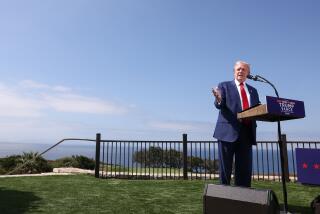Don’t need ‘don’t ask, don’t tell’
Anyone watching the Republican presidential debate last week might have been left thinking that those in the military are too intolerant of gays to serve with them; that all senior officers believe “don’t ask, don’t tell” is working and should remain in effect; and that anyone challenging the ban on gays serving openly must be a political operative planted by the Clinton campaign.
That was Wednesday night.
By Friday morning, the story line already had changed. A group of 28 retired generals and admirals made public a letter to Congress urging complete repeal of “don’t ask, don’t tell.” After 14 years, it now seems all but certain that the unpopular policy is in its last throes.
Evidence has been mounting for more than a decade that the presence of gays does not undermine unit cohesion; that despite the policy, tens of thousands of gays already do serve openly; and that discharging gays and lesbians wastes thousands of highly trained, badly needed troops, including Arabic linguists, medical experts and intelligence specialists. Polls have found that between 63% and 79% of Americans favor repeal, including a majority of conservatives and Republicans.
Yet our presidential candidates are behind the curve. Rep. Duncan Hunter of California said at the CNN debate that gays must be banned because service members’ “Judeo-Christian values” will brook no less. Arizona Sen. John McCain said military leaders are “nearly unanimous” in insisting that the ban must remain. The leading Democratic contenders say they oppose the policy. But few have explicitly backed the bill that would replace “don’t ask, don’t tell” with a policy of nondiscrimination: the Military Readiness Enhancement Act. It sits stalled in the House and has no counterpart in the Senate.
But if the rule on gay military service is to be a debating point in the 2008 presidential race, let’s at least have a useful national conversation. Let’s talk about how political and military leaders can bring this unsupported, irrational and archaic policy to as quick and painless an end as possible.
For those who remain unconvinced, some facts. Since the war in Iraq began, military members -- enlisted personnel and officers, active duty and retired -- have begun to reverse their opposition to openly gay service, complaining that the policy wastes valuable talent just when the military needs all the help it can get. Last week’s letter from the 28 generals and admirals was only the latest wave in a sea change in military opinion. Back on Jan. 2, Gen. John M. Shalikashvili, the former chairman of the Joint Chiefs of Staff, wrote in the New York Times that discussions with military personnel had helped change his mind about gays in the military, and he now believes that there is no need for the ban. Other senior officers also have reversed course. Adm. John D. Hutson, who backed the policy in 1993 and whose responsibilities as judge advocate general of the Navy included enforcing the ban, also has said it’s time for it to end, citing a “more enlightened population.”
Polls echo his assertion. A Zogby poll from December 2006 found that 72% of returning Iraq and Afghanistan war vets are “personally comfortable” with gays, and an Annenberg poll from 2004 concluded that, for the first time, a majority of junior enlisted personnel favor letting gays serve openly.
Of course, surveys can only measure those who are willing to state their opinion. Researchers at UC Santa Barbara’s Palm Center, a think tank that studies gays in the military, have spoken with dozens of senior officers and numerous enlisted personnel who believe the gay ban should end but who don’t feel comfortable publicly critiquing military policy while they’re still in uniform.
What will be required to end a policy that has clearly run its course? Because “don’t ask, don’t tell” is a federal statute, it must be changed by an act of Congress. The Military Readiness Enhancement Act has more than 100 sponsors, including some Republicans. But many lawmakers, including some Democrats, remain scarred from battle in 1993, when Bill Clinton made lifting the ban his first order of business as president. Action on gay service will require lawmakers -- and our next president -- to overcome whatever political fears they may have and take a stand for fairness and military readiness.
Congress has its role to play, but the Department of Defense could use its influence to reverse the policy. “The way things tend to work inside the Beltway,” explained Hutson a few years ago, “is if the Department of Defense puts up enough of a squawk, Congress would not stand in the way.” Congress and the Pentagon could both convene studies, surveys and hearings to ensure a full airing for the freshest data, military and expert opinion and the relevant experiences of foreign militaries, 24 of which now let gays serve openly.
Fortunately, there is plenty of research on successful institutional change of this sort, including studies of foreign militaries that lifted bans on gay service, that can serve as a useful playbook for reform. The data suggest specific steps to make the transformation effective and enduring. Senior leaders must support the change and communicate to lower-level commanders that their jobs depend on enforcing the new policy. A clear, single standard of conduct should be established -- for gays and straights -- that tolerates no harassment or other behavior that would undermine the unit. And the focus of change needs to be on behavior rather than attitudes, thereby respecting the right of all military members to hold to their beliefs.
If the United States can achieve this modest policy transformation, it will be a victory not just for gays and lesbians but for the U.S. military and the principles of democracy it is trying so hard to defend.
More to Read
Get the L.A. Times Politics newsletter
Deeply reported insights into legislation, politics and policy from Sacramento, Washington and beyond. In your inbox three times per week.
You may occasionally receive promotional content from the Los Angeles Times.








